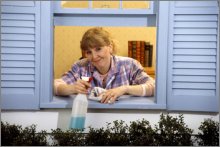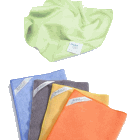New Research Shows Very High Risk for Developing
Asthma from Household Cleaners
by www.SixWise.com
You clean your house often, hoping to eliminate bacteria,
viruses and other germs as much as possible, but did you know
that the very act of cleaning could be harming your health?
|

Always keep rooms adequately ventilated during and
after cleaning.
|
Using cleaning sprays and air fresheners at least once a
week can increase your risk of asthma by 30-50 percent, according
to European researchers.
The team analyzed data from the European Community Respiratory
Health Survey, which included information about 22 centers
in 10 countries, along with interviews some nine years later.
They found that people who used cleaning sprays at least
weekly had a 50 percent increase in asthma
symptoms, wheeze and medication use. Meanwhile, people
who used the sprays at least four days a week were twice as
likely to be diagnosed with asthma.
The more you use spray household cleaners and air fresheners,
the higher your risk of asthma appears to be, the researchers
found. The products most commonly associated with asthma were
those most commonly used, including air fresheners, glass
cleaners and furniture-cleaning sprays.
The problem is so pervasive that the researchers believe
exposure to cleaning products could be responsible for 15
percent of, or one in seven, adult asthma cases.
How do household cleaners cause asthma? The exact reasons
are still unknown, but it could be the sensitizers that the
products contain (such as disinfectants and amines) that could
cause a sensitization resulting in asthma.
The products may also cause an inflammatory response that
could trigger asthma.
Risks of Household Cleaning Products Beyond Asthma
Asthma is just one health risk that's been linked to household
cleaning products and air fresheners. Others, including those
that have artificial "clean-smelling" lemon, pine
or orange scents, may give off excessive levels of toxic pollutants.
Researchers from the University of California-Berkeley and
Lawrence Berkeley National Laboratory analyzed 21 household
cleaners and air fresheners and found that:
-
Six of the products contained ethylene-based glycol ethers,
which are classified as hazardous air pollutants by the
U.S. Environmental Protection Agency.
-
12 products contained terpenes, which are found in the
pine, lemon and orange oils used to give cleaning products
their characteristic smells. Terpenes have been found
to react with ozone to produce a variety of toxic substances,
including formaldehyde (a toxic air contaminant) and secondary
organic aerosol (a form of fine particulate matter).
-
Three of the four analyzed air fresheners contained significant
amounts of terpenes.
|

Avoid using synthetic air fresheners in your home.
A safe alternative is to fill a spray bottle with water
and a few drops of your favorite pure
essential oil (try vanilla, peppermint, or lavender).
Spray it in the air or on fabrics to remove odors.
|
What happens if you're exposed to these toxic pollutants?
According to the researchers:
-
Cleaning a shower stall for 15 minutes with a product
containing glycol ethers may result in exposures that
are three times the recommended one-hour exposure limit.
-
Using an air freshener along with an ozone-creating air
purifier in a child's room may result in formaldehyde
levels that are 25 percent higher than California
recommends.
-
If you stay in the kitchen for two hours after using
a terpene-containing product, while ozone levels outdoors
are high, you would inhale about one-quarter of the total
daily guideline value for particulate
matter in California.
What's in Your Typical Household Cleaner?
Ironically, many of the products you use to clean your home
are toxic for you, your children and your pets. Here is a
breakdown of some of the more common ingredients in household
cleaners, and their potential risks to your health:
|
 Reach
a Deeper Level of Clean With PerfectClean Reach
a Deeper Level of Clean With PerfectClean
Because PerfectClean cloths, dusters and mitts are
made of ultramicrofibers that are only 3 microns in
size (smaller than many bacteria!), you can use less
chemical cleaner -- or even none at all.
-
Hospitals, schools & other commercial organizations
that require ultra-clean environments use PerfectClean
ultramicrofiber terry cloths over 100 TIMES before
replacing them.
-
Unlike the old common types of rags that simply
spread microscopic contaminants around when you
wipe with them, PerfectClean terry cloths hold fast
to everything they pick up!
-
Used wet with water or dry, you don't need to use
chemical cleaners to achieve the deepest clean ...
Traditional chemical-based cleaners can still be
used, but you'll use considerably less as the ultramicrofiber
can hold up to eight times its weight in liquid!
-
PerfectClean products are hypoallergenic, perfect
for those with allergies.
Learn
more about PerfectClean cloths, dusters and mitts now!
|
-
Phenols,
which are caustic compounds that are toxic to your central
nervous system, heart, blood vessels, lungs and kidneys.
-
Diethylene glycol found in window cleaners depresses
the nervous system.
-
Formaldehyde found in spray and wick deodorizers is a
respiratory irritant and suspected carcinogen.
-
Petroleum solvents in floor cleaners damage mucous membranes.
-
Perchloroethylene, a spot remover, causes liver and kidney
damage.
-
Butyl cellosolve, common in all-purpose, window and other
types of cleaners damages bone marrow, the nervous system,
kidneys and the liver.
How to Clean Your Home Safely and Naturally
Fortunately, there are many options out there to keep your
home clean using non-toxic, yet highly effective, products.
Sixwise.com highly recommends PerfectClean
cloths, dusters and mitts for all of your cleaning needs.
PerfectClean terry cloths contain patented built-in antimicrobial
protection and are made of ultramicrofibers that are only
3 microns in size, which is even smaller than many bacteria.
Because of this unique ultramicrofiber construction, you can
reduce the amount of chemical cleaners you use, or even eliminate
them altogether.
So, unlike ordinary cleaning rags and sponges, you can use
PerfectClean cloths wet with water or dry -- you don't need
to use chemical cleaners to achieve the deepest clean, which
makes them perfect for anyone who's looking to keep toxic
cleaners OUT of their home.
If you choose to use cleaning products, you can opt for natural
varieties that do not contain glycol ethers or terpenes.
We like Vermont Organics' Liquid
Sunshine Non-Toxic Cleaner, which is a powerful cleaner,
with a natural citrus scent, that delivers dramatic results
with a multi-functioning non-toxic formula that's safe and
mild, even on your skin.
Enviro-Rite also has an excellent line of safe
cleaning products -- they contain no hazardous ingredients,
petrochemicals, perfumes, dyes or animal byproducts, and they
have products for all of your cleaning needs, from carpet
and upholstery cleaner to spot lifters.
Finally, don't underestimate the power of natural cleaning
supplies like lemons, baking soda and vinegar. Check out Nine
Tips to Get Rid of Bad Smells in Common Household Locations
to find out how to get your home smelling fresh and clean,
using all-natural items that you may already have around your
house.
Recommended Reading
Chemical
Contaminants Linked to 180 Different Diseases
What
Exactly is in Every Breath You Take? Pieces of Bugs, Stars
and Much More
Sources
American
Journal of Respiratory and Critical Care Medicine Vol 176.
pp. 735-741, (2007)
California
Air Resources Board April 2006
MedPageToday.com
October 12, 2007